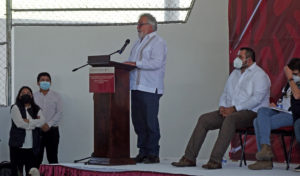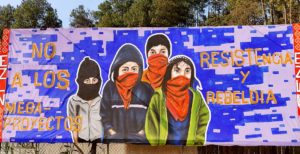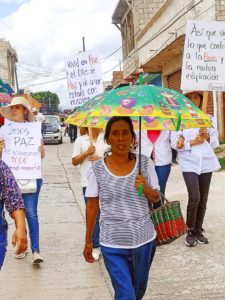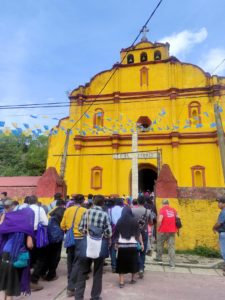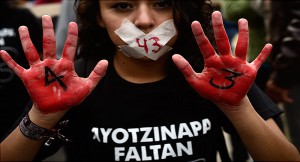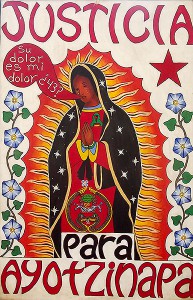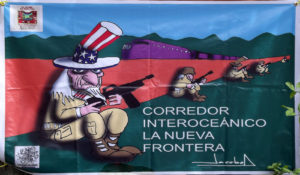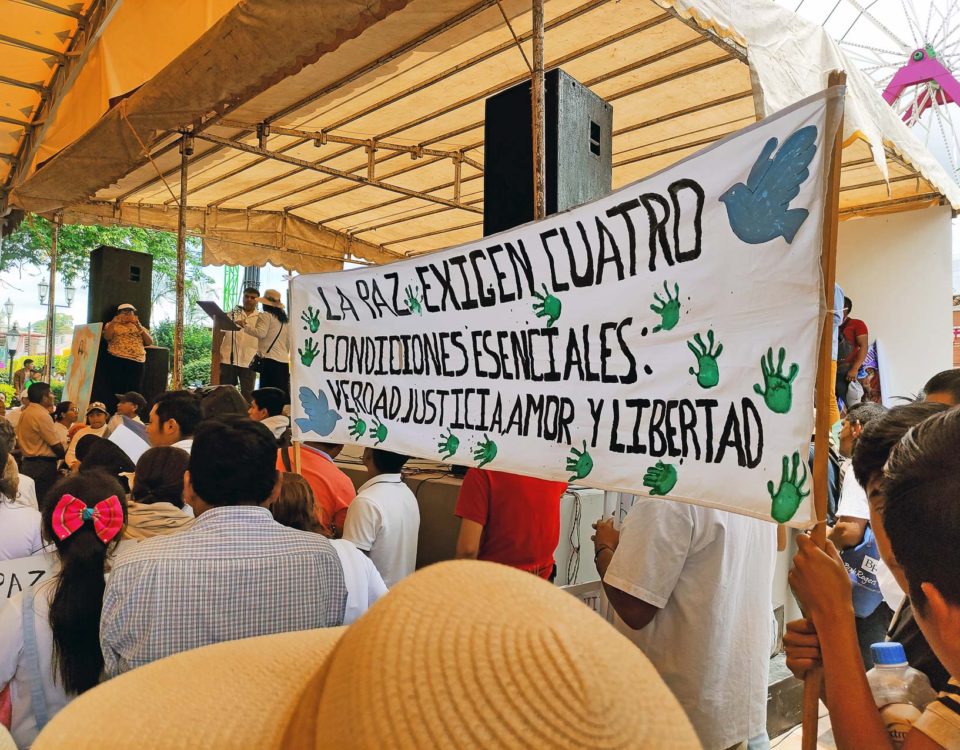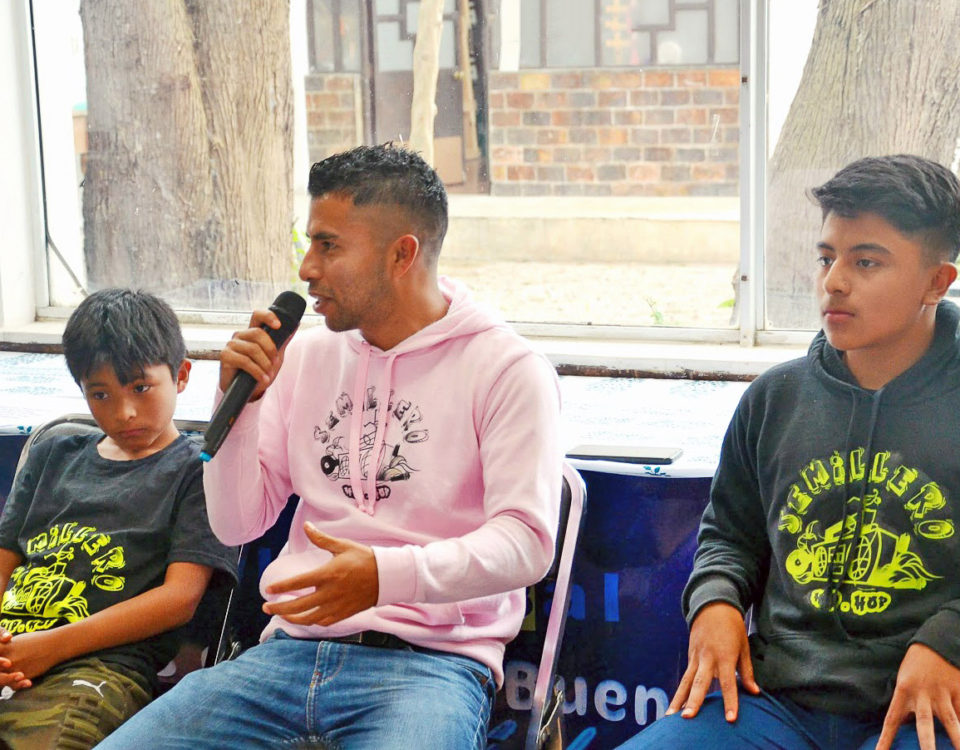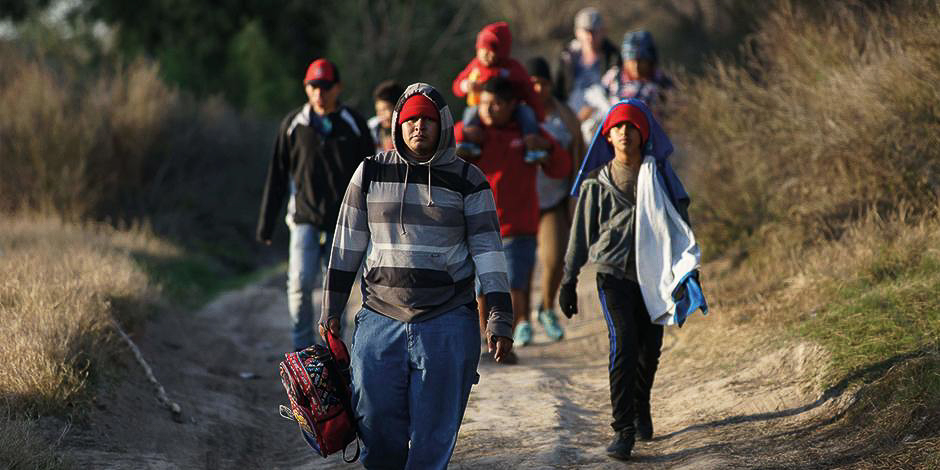
SIPAZ Activities (mid-February to mid-May 2023)
17/06/2023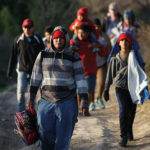
FOCUS: Forced Displacement: Global Crisis, National Incapacity
27/09/2023
I n June, President Andres Manuel Lopez Obrador (AMLO) recognized that during his government recorded homicides have exceeded those of previous administrations. In 2019, 34,690 murders were recorded, in 2020, 34,554, in 2021, 33,308 and in 2022, 30,968, while in the first quarter of 2023 there were 9,912, an average of 83 per day.
AMLO blamed the responsibility for these figures on previous administrations: “Where are the cartels created or tolerated by our government? There is none. They were consolidated by impunity and complicity when the Secretary of Public Security [Genaro Garcia Luna] was at the service of drug trafficking, it was a Narco state.” He stated that the social programs created as a way of addressing the causes behind insecurity are yielding results. He added that the level of lethality in confrontations with crime that was recorded in the past has reduced: “This is an indicator that we respect human rights, in practice. That’s why I do not accept what some civil society organizations maintain (…), because they want to put us in the same bag”, he stressed.
Human Rights Violations and Impunity: Elements of Continuity
In May, The New York Times reported that Alejandro Encinas, Undersecretary for Human Rights in the AMLO government, has been a victim of espionage through the Pegasus spy program. The hack would have occurred while the official was working on alleged violations to human rights committed by the Armed Forces, particularly in the case of forced disappearance of the 43 students from Ayotzinapa. The Times stressed that “the license for Pegasus is only permitted to government agencies, and although there is no definitive evidence on which one carried out the hack (…), the Army is the only body in Mexico that has access to the program.” Last October, the Network in Defense of Digital Rights (R3D) revealed that the Army bought Pegasus in 2019 and evidence of tracking has been found on cell phones of several activists and journalists. The next day, AMLO acknowledged that his Undersecretary was spied on, but he denied that it was under military orders. Various human rights organizations denounced what happened “as they constitute very serious incidents, and they show that, despite public commitments, State institutions have not avoided and, on the contrary, continue to allow the use of Pegasus.”
In June, more than 400 human rights organizations expressed solidarity with the Miguel Agustin Pro Juarez Center for Human Rights (Centro PRODH), after AMLO made “unfortunate statements that misinform and discredit” by declaring that the organization, like others, remained silent about cases of human rights violations committed by previous governments “for alleged partisan affiliations and also suggesting that there is an intention by these organizations for his government to fail.” They stressed that “violations of human rights human rights in the country persist and have not stopped happening.” They stated that addressing this crisis “requires permanent dialogue with civil society to seek actions that help reverse this situation. For this, political will is necessary to investigate and prosecute those who historically continue to hold power, and those who make use of it, to vilify, discredit and divert attention from the real problems.”
In July, AMLO received Estela de Carlotto, current president and one of the founders of the Grandmothers of Plaza de Mayo in Argentina, who have helped locate people who disappeared during the military dictatorship in their country. Given this, groups of searching mothers in Mexico demanded that the president also receive them “to talk about the tragedy” that the country is experiencing in terms of disappearances and in response to which, “the authorities have not answered neither at the federal level nor at the state level.” They also noted: “We are not their opponents, we are like Estela de Carlotto, mothers, family members, broken by pain, we only seek to know what happened to our loved ones (…), the President has not wanted to receive us in these five years of government.” They added that “everything that has happened in Mexico for 15 years is equal to or more serious than what happened in Argentina: here there are more than 100 thousand missing people and more than 50 thousand unidentified bodies and human remains.”
In August, the Mechanism for Access to the Truth and Historical Clarification of the serious violations of human rights committed from 1965 to 1990 (MEH), reported having experienced “serious difficulties in accessing unrestricted consultation of documentation history coming from agencies in charge of security, intelligence, armed forces and police.” This, despite the fact that in 2019 AMLO signed an order requiring all government agencies to provide all available information.
Counterweights and Rejection Do Not Stop Progress of Megaprojects
In May, the Supreme Court of Justice of the Nation (SCJN) determined as unconstitutional the AMLO decree of November 2021, through which he intended to declare the construction, functioning and operation of “priority works” such as the Maya Train or the Tehuantepec Isthmus Interoceanic Corridor as matters of national security and public interest. This was in response to the constitutional controversy presented by the National Institute for Transparency, Access to Information and Protection of Personal Data (INAI). A few hours after the highest court ruled in favor of the INAI, Lopez Obrador presented a new decree with the same purposes as that initially presented, contravening what was resolved by the Supreme Court. The next day, the INAI filed a new complaint. The initial decree allowed the Federal Government to begin construction without having the necessary permits. It restricted access to information, since it could reserve documents under the pretext of national security. The President, for his part, denied that the new decree seeks to hide information about the works and justified their protection.
In May, the Mexican Center for Environmental Law (CEMDA) reported that “the First District Court in Yucatan granted the definitive suspension in order to suspend or paralyze any act of logging or clearing on the land” that covers four sections. Three years after presenting an injunction, indigenous, peasant, urban and coastal communities of Campeche, Yucatan and Quintana Roo, as well as civil organizations, obtained the definitive suspension of the project. The Court noted “that the provisional authorizations issued (…) do not replace the authorizations that imply a technical and scientific study prior to the work that, by not being issued, in itself puts at risk the ecosystem where it will be carried out, because it would allow the start of the work without knowing the repercussions and damages that may be caused.”
In July, the International Tribunal for the Rights of Nature condemned the Mexican State for “crimes of ecocide and ethnocide” in the construction of the Maya Train. It urged its suspension, demilitarization of all indigenous territories where it is developed, as well as to “end persecution, threats, harassment and intimidation against defenders of nature.” In addition to the immediate suspension of the train, the ruling orders several measures of comprehensive repair of the ecosystems affected by the execution of the project and its collateral facilities, as well as “all the social impacts caused.” AMLO has refused repeatedly to acknowledge that the project causes ecological damage, and has accused the experts who criticize the work of being “naive” and being manipulated by “conservative interests.”
CHIAPAS: Hot Spots Continue to Multiply
From north to south and east to west, not a week goes by without an incident being reported related to the presence of groups linked to organized crime in the state: murders, kidnappings or disappearances, patrols or “narco checkpoints” are among the situations reported with greater frequency.
The most alarming situation is occurring in the municipalities on the border with Guatemala. At the end of May, in the municipalities of Frontera Comalapa, Chicomuselo, La Trinitaria and Amatenango de la Frontera, human rights networks reported: “entire communities cut off due to road blockades, suspension of classes in schools, electricity cuts that cut off the population, burning of vehicles, installation of narco banners, armed confrontations, threats of home invasion to check cell phones, kidnappings, forced recruitment of men from the communities to integrate them into their ranks, and death to those who resist in any way.” They also reported forced displacement of at least three thousand people due to fear of unleashed violence allegedly due to clashes between the Jalisco New Generation and Sinaloa cartels over the control of the border area.
A week later, state and federal security forces regained control of the area and daily activities could be resumed. However, there is some skepticism regarding the possibility that the military presence will reduce violence in the medium term when it has not done so in the past. The Fray Bartolome de Las Casas Center for Human Rights (Frayba) pointed out that it is not new in the area: “The acquiescence of the State through military institutions is identified in the territories where these events are taking place. In the town of El Jocote there is a detachment of the Mexican Army. On the Paso Hondo road section a detachment of the National Guard is established in Frontera Comalapa. The largest barracks of the Mexican Army in Chiapas is in the municipality of Chicomuselo. Testimonials refer to the fact that in front of these institutions caravans of [criminal] vehicles travel with heavily armed people”, it said. However, a large part of the population, feeling totally defenseless, continues to demand the intervention of the National Guard and the Army, as well as strengthening security and surveillance on different road sections.
Demands To Stop Violence in Zapatista Territories
On May 22nd, Gilberto Lopez Santiz, Support Base of the Zapatista Army of National Liberation (BAEZLN) was the victim of an armed attack. Hours before, the Moises y Gandhi Autonomous Community (Ocosingo) reported the armed attack with “130 small caliber shots and 15 high caliber shots” perpetrated by members of the Regional Organization of Ocosingo Coffee Growers (ORCAO). The All Rights for All Network (Red TDT) demanded that urgent medical attention be provided for Lopez Santiz; that responsibilities are defined for attempted murder and armed attack; and, the immediate cessation of the attacks by ORCAO.
In context, Frayba recalled that, since the armed uprising in 1994, the EZLN “has been harassed and continually attacked by the Mexican Army and groups related to the State (…) with the purpose of destroying and co-opting resistance and emancipatory movements who are fighting for respect for their rights.” It declared that “this six-year term of the government of Andres Manuel Lopez Obrador, has not been left behind, the attacks on the recovered lands of the EZLN are constant, (…) the EZLN Support Bases have suffered serious violations to human rights such as arbitrary deprivation of liberty, torture, forced displacement and several injuries from firearms.” Incidents continue to increase “due to active impunity generated by the Mexican government.” Various acts of national and international solidarity were held in subsequent weeks.
AMLO, when questioned about these cases, declared that the situation is not as such and attacked civil organizations. “The reactionaries, the conservatives, do not want to accept that there is a new reality.” “Even the United States government gives money to organizations of pseudo-environmentalists, pseudo-human rights defenders”, he added. Given these statements, Frayba questioned “the denialism” of the President regarding the violence in Chiapas, which deepens impunity “driven by municipal, state and federal players that contribute to dispossession, exploitation and social marginalization.” It highlighted that from 2019 to date “more than 110 armed attacks against communities that belong to the region of Moises y Gandhi” have been documented. For its part, Red TDT Network stated that it has documented the increase in violence in Chiapas and that it is “concerned that the problem is denied from presidential spaces.”
Journalists, Another Vulnerable Group
In June, human rights organizations and journalist networks warned about “the climate of hostility against the press in the state of Chiapas, derived from the climate of violence that exists in various regions of the state, mainly due to events related to actions by armed and organized crime groups.” In the most recent incidents they pointed out the placement of banners with intimidating messages against the press in Frontera Comalapa, although they reported that this is “a generalized situation in the state.”
They recalled that, in 2022, Article 19 documented 31 attacks against the press in Chiapas, an average of 2.5 a month, “the highest number of documented assaults in the state since the organization documents violence against the press. This placed the federal state in ninth place in attacks against journalists and media in the country. Since one in three of the attacks in Chiapas in 2022 were directly perpetrated by organized crime groups, this violence represents a serious warning for journalistic practice.” They denounced that “there are no guarantees of protection or access to justice, which has caused the displacement of at least two journalists in this state.”
Voices Denouncing Violence
In May, mothers of women who have been murdered and disappeared in Chiapas started a sit-in in front of the government palace in the capital Tuxtla Gutierrez, demanding justice and truth regarding what happened to their daughters. They affirmed that there was negligence on the part of the Attorney General’s Office of the State (FGE) and that, due to corruption, the aggressors have not been captured and convicted. “Enough of simulations, for us and for all, justice and justice for all”, they declared. The cases continue to accumulate. In August, the 50+1 Women’s Collective denounced the “alarming increase in violence against women in Chiapas. In 2022, they registered at least 40 cases of feminicide.” Added to these cases are 19 femicides in 2023, according to their records.
In June, believers from the parishes of Chicomuselo went on a pilgrimage to highlight the growing violence: “We are suffering as people from murders, kidnappings and disappearances, as well as the constant threat, harassment, persecution and defamation against servants of our parish community.” They mentioned that the presence of organized crime groups that “operate with total impunity with the objective of controlling territory, looting, extraction and mining exploitation and charging for land rights” is becoming stronger. They demanded “the rule of law be fulfilled (…) without leading to the militarization of our communities.”
On July 5th, thousands of Catholics from the diocese of San Cristobal made a pilgrimage, in at least seven municipalities, to demand that the authorities stop the violence generated by armed groups and guarantee peace and social stability. Parishioners from the parishes of San Cristobal de Las Casas, Oxchuc, Ocosingo, Teopisca, Tenejapa, San Juan Cancuc, Chamula, Zinacantan, Chenalho, Simojovel among others participated in the ”March/Pilgrimage for Truth, Justice and Peace Building”. Believing People affirmed that the authorities deny reality: “It seems that they live in a parallel world and different from the one in which the people live, but the State has the responsibility for the insecurity that exists in the country.”
On July 9th, thousands of Catholic and evangelical parishioners made a pilgrimage to Las Margaritas, where their religious leaders asked to stop the increase in violence: “sale of alcohol and drugs, brothels, attempted kidnappings, shootings, homicides, (…), abuse of power, clashes between organizations, forced displacements, embezzlement of resources”, among others. They claimed that the authorities “try to hide all these manifestations of death with celebrations that […] contribute to seducing and domesticating citizens towards next year’s elections.” They claimed that “the people’s feeling is one of helplessness in the face of the powers that represent us at the political level, since it has been demonstrated that the interests of those who occupy these positions are very far from the needs of their people.”
In August, Frayba presented a complaint against the Mexican State before the Working Group on Arbitrary Detentions (GTDA) of the UN for torture and fabrication of culprits that criminalizes indigenous defenders. On this occasion, they addressed two cases; that of Manuel Gomez, support base of the EZLN, and that of five Tseltal indigenous people from Cancuc, defenders of the territory and human rights. Frayba “confirms the systematic pattern of criminalization of indigenous defenders by the government of Chiapas, among whose characteristics are: complicit participation of the Indigenous Justice Prosecutor’s Office used to control the people through the criminalization of the exercise of their political rights, to autonomy and self-determination as indigenous peoples, false accusations, torture, excessive use of informal preventive detention and false witnesses, participation of community authorities, Arbitrary Deprivations of Liberty, arrests with the participation of Army personnel, National Guard (GN)”, among others.
GUERRERO: Feeling of Helplessness with Past and Present Violence
There are few expectations for access to justice when progress is not achieved even in the most notorious case in the state. In July, the Interdisciplinary Group of Independent Experts (IGIE), formed by the Inter-American Commission on Human Rights (IACHR) to give follow-up to the case of forced disappearance of 43 students from the Ayotzinapa normal rural school, presented its last report. It made known the obstacles it has faced, the pending issues that will remain on recognizing that there are no conditions for them to continue their work. It again pointed to the Armed Forces that are the protagonists of more than half of the report. They managed to map the movements and communications of different authorities in Iguala, before, during and after the attacks against the student teachers. The facts point to the participation, by action or omission, of practically all security bodies.
Subsequently, the Office in Mexico of the United Nations High Commissioner for Human Rights Human Rights (UNHCHR) regretted that, despite the political will expressed by the Federal Government to know the truth, the Armed Forces have not provided all the information requested by the IGIE. For his part, AMLO stated that there is a campaign against the Mexican Army that seeks to weaken the Armed Forces. He assured that they have been cooperating in this case. The fathers and mothers of the 43 student teachers declared that despite the departure of the IGIE, “the case is not going to remain unpunished, we are going to continue.”
Disappearances continue to be one of the most prominent problems. In June, the group of relatives of the disappeared, Luciernaga, the National Search Commission and Tlachinollan, accompanied by members of the National Guard and the Army, carried out a search day in Tlapa de Comonfort that made it possible to locate eight bodies and 70 bone remains located in hidden graves. The families continue to claim that “the authorities are not interested because since the husbands, wives, mothers, fathers, daughters and sons disappeared, they never activated the alerts to carry out the searches. It was an ordeal to file complaints because they were not listened to, on the contrary, they were criminalized. They had to face cumbersome procedures and despotic treatment by the authorities.” In fact, “they were the first to explore the hills and ravines, even with the fear of being disappeared. Some families were threatened, but they were not intimidated because the hope of finding their loved ones prevailed”, the Tlachinollan Human Rights Center stressed.
Meanwhile, outbreaks of violence continue to occur in almost all of Guerrero. In July, public transport units were set on fire in different parts of the capital, Chilpancingo. Five taxi drivers were killed and another five people were injured. Some taxi drivers demanded the release of their leaders detained for alleged possession of cartridges and drugs. Public transportation stopped its services, businesses closed and the streets emptied. “The worst performance was the absence of the authorities (…); the inaction of the police bodies and the withdrawal of the National Guard. The politicians, unlike public events where they wear their best outfits, did not show their faces, nor did they act to enforce the rule of law”, claimed Tlachinollan. “Governor Evelyn Salgado’s great challenge is (…) to dismantle the criminal structure that is rooted in the state apparatus”, it concluded.
AMLO acknowledged that violence in the state “is not going to magically disappear.” He considered that it was progress that through dialogue the release of the 13 police officers and officials held during road blockades organized by residents close to the Los Ardillos criminal group was achieved after the arrest of two of its members. “Do not allow yourself to be manipulated by those who run these gangs that are linked to crime. (…) Remain silent, but do not allow yourselves to be manipulated”, he declared. “It is an issue that has to be addressed at the root, the origin, the dismantling of a social base. It will only be possible with equity and social development, it will not be through violence and repression”, said Alejandro Encinas on the State’s strategy in the face of the presence of criminal groups in Guerrero.
Meanwhile, the vulnerability of human rights defenders and journalists remains extreme. In August, journalist Nelson Matus Peña was murdered in Acapulco. He was editor of Lo Real de Guerrero website, a reference for the police or red top news. The next day, local, state and national journalists, as well as photographers and cameramen from various media, protested in Chilpancingo to demand justice. They reported that there were two murders in just two months and two attempts to kill two other journalists in Acapulco alone. In addition, they have documented eight assaults on reporters’ homes in two years, where the criminals only steal work materials; a dozen journalists are in forced displacement and two are missing. In 20 years, at least 20 murders of journalists have been recorded in Guerrero.
OAXACA: Human Rights Violations in the Context of the Interoceanic Corridor
In July, a Civil Observation Mission was carried out in which 23 national and international civilian organizations participated to “document human rights violations and attacks against defenders and communities in the context of the megaproject called the Tehuantepec Isthmus Interoceanic Corridor (CIIT).” It reported multiple violations of the human rights of the people who live in these areas and those who defend the collective rights of indigenous communities; “specifically their rights: i) to information, since the communities claim that they have not had access to all the relevant information related to the construction of the megaproject and its effects on their territories; ii) to participation, self-determination, territory, a healthy environment and to cultural identity. This is because a prior, free and informed consultation was not carried out in accordance with what is established by national and international standards; and iii) to life, integrity, personal freedom and freedom of expression, among others, due to the attacks, physical violence, harassment and criminalization that they are experiencing.”
The Mission recorded “at least 21 cases of intimidation, harassment and threats against people defenders, their families or groups; 11 cases of physical and psychological violence, as well as forced evictions; three homicides of defenders between October 2022 and July 2023; two cases of defamation through powerful public media; and 43 cases of criminal complaints against local authorities and community defenders” in different communities. Among the responsible authorities, the National Guard, the Navy, SEDENA, the State Police, the Ministry of Communications and Transportation, municipal authorities and the Agrarian Attorney’s Office were highlighted. Various companies, armed groups and local leaders were also identified.
Faced with a case also documented in the Mission, in July, the international organization Front Line Defenders issued an Urgent Action calling on the Mexican government to drop the charges against David Hernandez Salazar, member of the Assembly of Indigenous Peoples of the Isthmus in Defense of the Land and Territory (APIIDTT) and opponent of the installation of an industrial park in Puente Madera, in the town of San Blas Atempa, as part of the Interoceanic Corridor project. Also, it asked to withdraw the investigations and arrest warrants against 17 other members of the APIIDTT and guarantee their right to due process. Likewise, it demanded the “cessation of the criminalization of David and the defenders of Puente Madera”, as well as measures to guarantee that all human rights defenders can work “freely without fear of restrictions or reprisals.”


